Babies
 for cultural and maternal nudity throughout.
for cultural and maternal nudity throughout.
Reviewed by: Thaisha Geiger
CONTRIBUTOR
| Moral Rating: | Good |
| Moviemaking Quality: |
|
| Primary Audience: | Teens Adults |
| Genre: | Documentary |
| Length: | 1 hr. 29 min. |
| Year of Release: | 2010 |
| USA Release: |
May 7, 2010 (wide—510+ theaters) DVD: September 28, 2010 |
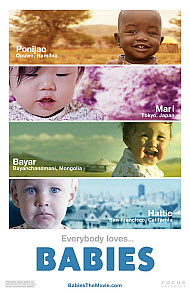

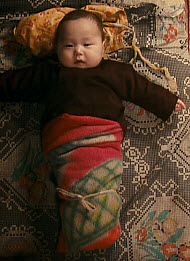
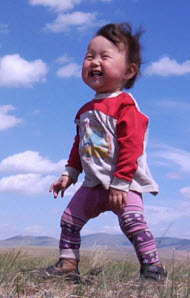
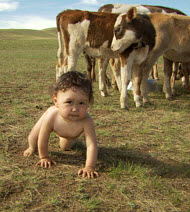

Biblical women with admirable character, include: Mrs. Noah, Mary (mother of Jesus), Esther, Deborah, and Milcah, daugher of Zelophehad
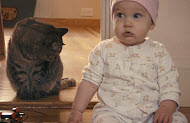
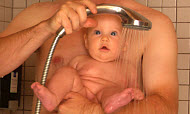
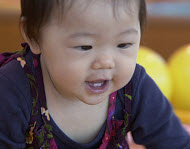

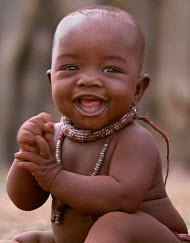
| Featuring |
|---|
| Hattie (herself), Mari (herself), Ponijao (herself), Bayar (herself) |
| Director |
|
Thomas Balmès |
| Producer |
| Chez Wam, Studio Canal, Amandine Billot, Alain Chabat, Christine Rouxel |
| Distributor |
“Everybody loves… ‘Babies.’”
“Babies” is an accomplished documentary that focuses on exactly what the title suggests: babies. There is no narration, subtitles, or product placements. Even the parents take a backseat as the primary focus remains on how these four brand-new children journey through their first year of life in their given countries.
Excellently shot by Thomas Balmes, we are shown two babies from poorer countries: Ponijao from Namibia, and Bayar from Mongolia. These two are fascinated with what little they have, venturing boldly around dogs, cattle, and goats. They find toys in the simplest of things, such as toilet paper and a dog’s tongue. From the more developed countries is Mari from Japan and Hattie from California. These parents give their children expensive gadgets, academic toys, and classes to help them mentally excel.
Finding this film entertaining truly depends on whether you find enjoyment in watching a baby’s exploration of his world. “Babies” closely follows as the four grow from newborns to adventurous toddlers. As the documentary progresses, an interesting contrast begins to emerge as the audience witnesses how the babies, from opposite ends of the world, entertain themselves. The more developed countries tend to be weary of germs and feel the need to attend baby groups and begin academics early. While the lesser developed countries are extremely poor, their babies appear just as happy and even more adventurous since they’re allowed to roam more freely. Balmes’ excellent direction allows these differences to appear naturally without the sway of a biased narration.
I found no objectionable content in the documentary. However, whether or not, one finds offense in the film depends on their convictions. There’s a lot of maternal nudity in the film. There are several scenes of breastfeeding and the mothers lying unclothed (only breasts shown) with their children. While I find this completely natural, some might feel uncomfortable. The Namibian tribal women regularly walk around topless. Several young children are shown to be wearing little or no clothing, as well. Children’s mischievousness is recorded and shown; some are shown dragging cats around and making their siblings cry. While there’s hardly any dialogue, there is one scene where Hattie’s parents take her to some sort of New Age group where they have a sing along about Mother Earth taking care of them. However, in a humorous, truthful moment, Hattie bolts to the door and attempts to leave.
I recommend “Babies.” If you’re into documentaries or even just love babies for their curious nature, I feel you might thoroughly enjoy the film. While the first part feels a little slow, the film becomes quite enjoyable once the children’s personalities begin to shine as they all interact differently with their unique surroundings. It was the first film in a very long time where I did not feel any spiritual guilt by being entertained. “Babies” helps show just how miraculous of a creation babies are and how much of a blessing they are as stated in Psalm 127:3:
“Behold, children are a heritage from the Lord,
The fruit of the womb is a reward.”
Violence: Minor / Profanity: None / Sex/Nudity: Heavy
See list of Relevant Issues—questions-and-answers.


It was interesting to see how the different cultures chose to raise their children. Some of the material concerning maternal nudity could be deemed as offensive by some Christians who are completely against any form of immodesty. However, I found it to be a natural potrayal of motherhood at its finest without any censorship. Naked children are potrayed often, but it is, once again, a natural depiction of early childhood.
I would reccomend this film to any. There is a depiction of the New Age chant, but as you will find out, the little girl involved was not too excited about it herself. You coo and laugh at all of their little antics and makes you appreciate the little steps they take all the more. Go and see this movie, it is absolutely precious…
Moral rating: Excellent! / Moviemaking quality: 5
Moral rating: Excellent! / Moviemaking quality: 5
Of course, as the babies become older the breastfeeding scenes become less and less, however, the african babies scene are usually showing the mothers topless as that is their culture. My husband I both actually enjoyed watching the movie—it’s fun to watch the children grow and learn. However, for my sake my husband did look away each time the mothers breasts were in view. The camera didn’t avoid showing the whole process—i.e., some movies show a mother feeding her child with a blanket around their top.
Also, think of it this way: would your husband be watching a mother breastfeeding in church or other public place if the mother didn’t cover up? Just because it’s on screen does not mean lets go ahead and view it all. My husband chose to look away on those parts of the movie (by the way, they also show the American mother in the hot tub with her baby, both are naked)—and if you would like to enjoy the movie I recommend the same, be prepared to look away for at least a good chunk of the film.
Moral rating: Better than Average / Moviemaking quality: 4½
Moral rating: Extremely Offensive / Moviemaking quality: 1



My Ratings: Moral rating: Excellent! / Moviemaking quality: 5